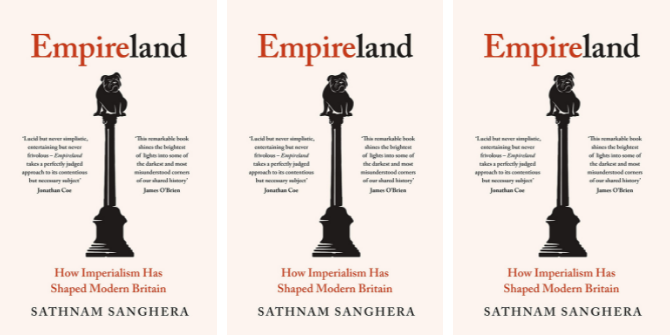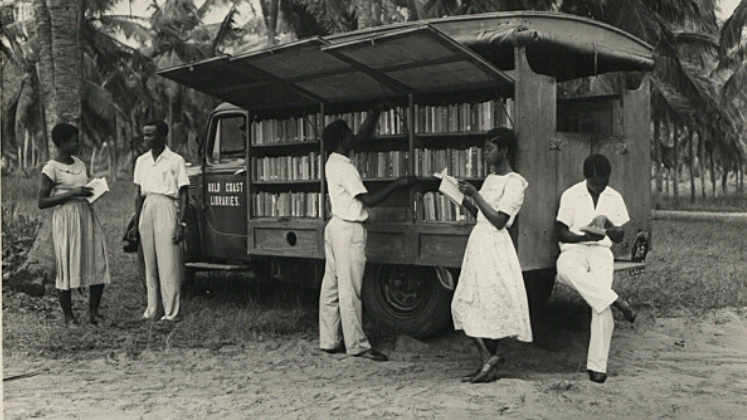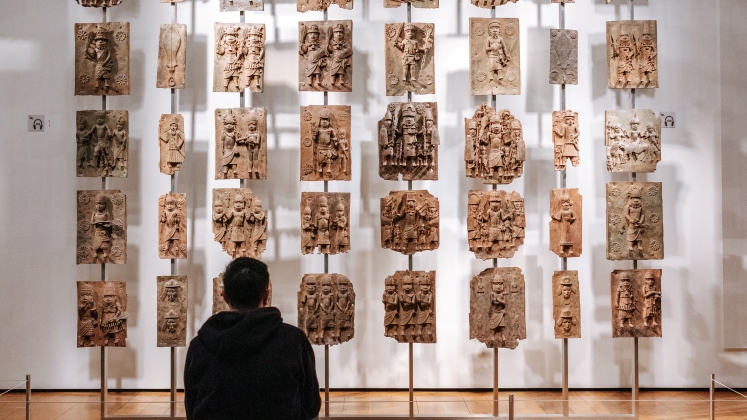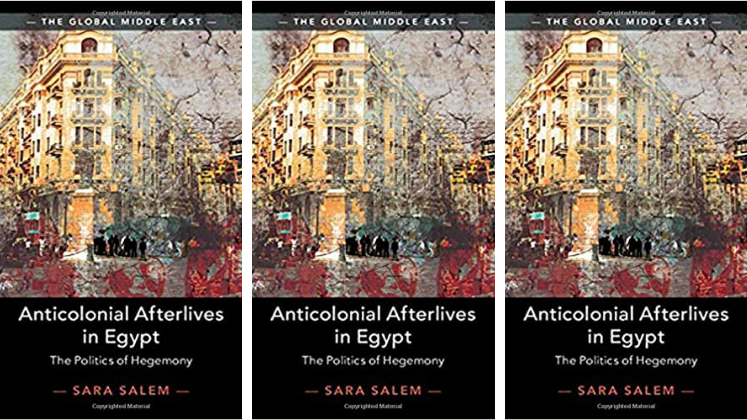In Empireworld, a follow-up to Empireland (2021), Sathnam Sanghera examines the lingering influence of British imperialism in contemporary global structures, from multinational corporations and intergovernmental bodies to cultural industries and legal systems. Written with the strong narrative form and clear language of a journalist, Sanghera’s compelling analysis lays bare the persistence of colonial power dynamics today, Lori Lee Oates.
Empireworld: How British Imperialism Has Shaped the Globe. Sathnam Sanghera. Viking. 2024.
 Empireworld: How British Imperialism Has Shaped the Globe (2024) is journalist Sathnam Sanghera’s follow up to, the award-winning Empireland (2021). This previous effort explored the legacies of empire and was named Book of the Year at the 2022 British National Book Awards and inspired the Channel 4 series Empire State of Mind. Empireworld follows on from its predecessor by considering how British imperialism continues to influence the contemporary world. Though not strictly an academic work, this extensively researched book brings to light important and often obscured facets of ongoing imperialism. Its chapters span discussions of topics including white saviours, legal systems rooted in empire, and the role of botany in justifying imperial expansion.
Empireworld: How British Imperialism Has Shaped the Globe (2024) is journalist Sathnam Sanghera’s follow up to, the award-winning Empireland (2021). This previous effort explored the legacies of empire and was named Book of the Year at the 2022 British National Book Awards and inspired the Channel 4 series Empire State of Mind. Empireworld follows on from its predecessor by considering how British imperialism continues to influence the contemporary world. Though not strictly an academic work, this extensively researched book brings to light important and often obscured facets of ongoing imperialism. Its chapters span discussions of topics including white saviours, legal systems rooted in empire, and the role of botany in justifying imperial expansion.
Sanghera weaves together compelling narratives of empire and decolonisation
Using his journalistic skills, Sanghera weaves together compelling narratives of empire and decolonisation. He effectively demonstrates the continued pervasiveness of empire, often by discussing large corporations that were forged during the height of colonialism. Many of these businesses are large multinationals that continue to influence our daily lives. However, what is most impressive about Sanghera’s analysis is the sheer number of contemporary practices that he roots in imperialisms across the globe. The book, then, contributes to the body of work which argues that colonial ways of thinking and operating persist today and defy the temporal framing that is invoked to conceive of coloniality as “past” and our current era as “post-colonial”.
corporations [like BP and HSBC] were critical to the extractive economics of empire
By way of example, Sanghera discusses corporations such as British Petroleum (BP) that “grew out of the Anglo-Persian Oil Company, which was founded by the British when oil was discovered in Iran” in 1909, and the Hong-Kong and Shanghai Banking Corporation (HSBC) which he says was “established in 1865 to facilitate British imperial trade”. These corporations were critical to the extractive economics of empire. He maintains that British Airways “was formed from a combination of the British Overseas Airways Corporation (BOAC), British European Airways (BEA) and Imperial Airways, which offered routes to imperial territories” (13). Transnational travel was an important aspect of being able to extend imperial reach and trade, as was also accomplished by the steam ships and railroads that we have come to associate with empire.
The idea of an ongoing colonial present is far from new. As early as 1995, McClintock suggested in Imperial Leather that the term neo-colonialism was more appropriate to imperial analysis than the concept of post-colonial, which she viewed as “prematurely celebratory” (13). In Empire (2000) Hardt and Negri put forward the idea that the monarchs of the contemporary period are the institutions of the rules-based international order, including constitutions, the then Group of Eight (G8), the North Atlantic Treaty Organization (NATO), and the International Monetary Fund (IMF), whose power is heavily skewed towards Western nations. More recently, Jamie Martin’s The Meddlers: Sovereignty, Empire and the Birth of Global Governance (2022) has demonstrated the imperial roots of such institutions. This imperialism is ongoing in the sense that international organisations continue to infringe upon the sovereignty of vulnerable nations in granting aid and support from international systems, for example, in how IMF financing was usually contingent on recipient countries across Africa, Latin America and Asia opening their economies and economic decision-making to Western capital. Furthermore, these practices emerged in the earliest days after the founding of the post-World War I world order. Empireworld should be seen as a contribution to this body of literature.
International organisations continue to infringe upon the sovereignty of vulnerable nations in granting aid and support from international systems, for example, in how IMF financing was usually contingent on recipient countries across Africa, Latin America and Asia opening their economies and economic decision-making to Western capital.
Sanghera attempts to take on the question of whether decolonisation is even possible and seemingly comes down on the side that it is not. For example, he discusses the concept of the “British baddie” in Hollywood films. Sanghera maintains that Alan Rickman as the Sheriff of Nottingham in Robin Hood: Prince of Thieves (1991), and Christopher Lee as Count Dracula (1958) are examples of this narrative. For Sanghera, these characters are the bad guys from the heart of empire, reflected on screen in fictional representations: “America finds it natural to equate Britishness with ‘evil’, even though it is itself a creation of the ‘evil’ enterprise in question.” He fails to mention, however, that Robin Hood was played by the American Kevin Costner, who saved England from an actual British actor. Rickman’s Hans Gruber, an East German terrorist in Die Hard, might fit better with Sanghera’s point that British actors are often cast as the bad guys (16). While this does raise the important question of what decolonisation efforts should look like, Sanghera’s perspective ignores the ongoing imperial soft power of the American and British film industries in continuing to control narratives of power across the globe. He also neglects to explore the diversity efforts in casting that are already taking place in products of popular culture such as the musical Hamilton and popular Netflix series Bridgerton. These entertainment enterprises suggest that decolonisation is not only possible, but that it can also be good business.
In Chapter Two, entitled “Useful Plants”, Sanghera addresses the importance of the institution of Kew Gardens and the role of botany in the imperial expansion. While the gardens can be traced to 1299 under Edward I, what we now think of as Kew Gardens was formed in 1772 by the joining of the estates of Richmond and Kew. In 1840, the gardens were adopted as the national botanical gardens of the United Kingdom. Today, they are curated by the public Royal Botanical Gardens and boast living collections of 27,000 taxa, taken from all over the world. Such diversity was, of course, made possible by the reach of empire. Certainly, the links between botany and empire is well-trodden academic ground in books such as Lucile H. Brockway’s Science and Colonial Expansion (2002) and Corey Ross’ Ecology and Power in the Age of Empire (2017). The role of agriculture in the rise of labour extraction has also been covered previously in books like The Rise and Fall of the Plantation Complex (1990). It is noteworthy, however, that the Royal Botanical Gardens Kew does sell Empireworld in its shop, suggesting they accept it as a valid examination of the history of the gardens.
the public Royal Botanical Gardens [at Kew] boast living collections of 27,000 taxa, taken from all over the world. Such diversity was, of course, made possible by the reach of empire
In the chapter “A Rational and Intelligible System of Law” (5) Sanghera discusses the ongoing influence of the Judicial Committee of the Privy Council (JCPC) in systems of law across the Commonwealth. In my own country, Canada, the JCPC was the highest legal decision-making body until 1949. Much case law was created in London which continues to establish the principles on which the country is run. Certainly, the influence of the British Common Law system is unmistakeable, as is the importance of the Napoleonic Code, as a legacy of French imperialism. Sanghera discusses the impact of homophobic laws in India, and across the planet, that were designed to prevent homosexual relations between white colonial administrators who were away from their wives. A considerable amount of scholarship has been published on race and sex under imperial rule by scholars such as Elizabeth Kolsky in Colonial Justice in British India: White Violence and the Rule of Law (2009) or editors Tony Ballantyne and Antoinette Burton’s Bodies in Contact: Rethinking Colonial Encounters in World History (2005). It is well-established by such texts that the hyper-sexualisation of the colonised (usually persons of colour or Indigenous persons) was a key aspect of empire.
Britain cannot lecture other nations on features of the contemporary world such as homophobia and climate change when imperialism set the world on this trajectory
Finally, Sanghera concludes: “It’s no longer an option for the British to sit around wondering, self-indulgently, whether their empire was ‘good’ or ‘bad’”. Recognition must be given to the significant disadvantages that the seeds of empire sowed in the countries of the Global South. Furthermore, he argues that Britain cannot lecture other nations on features of the contemporary world such as homophobia and climate change when imperialism set the world on this trajectory (247). This recognition, presented in an accessible way that combines the research and narrative skills of an effective journalist, will be the book’s most lasting contribution.
Note: This review gives the views of the author and not the position of the LSE Review of Books blog, nor of the London School of Economics and Political Science.
Image credit: Guy William on Shutterstock.







